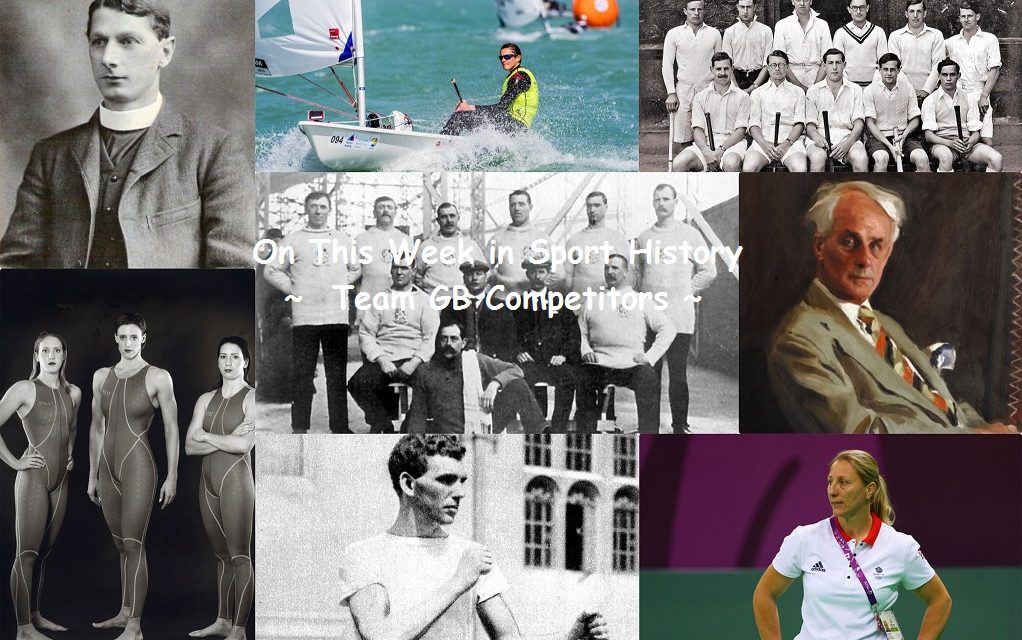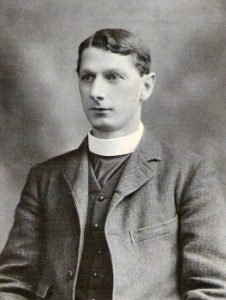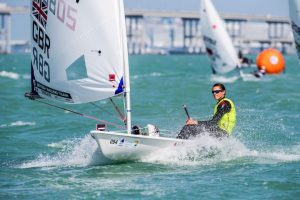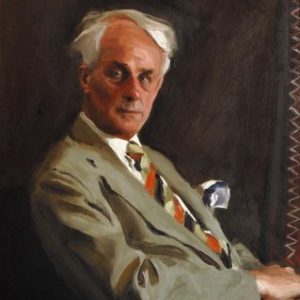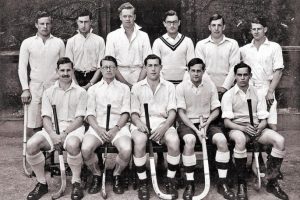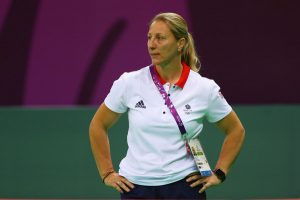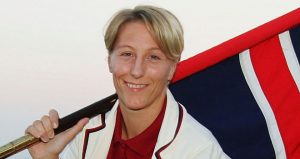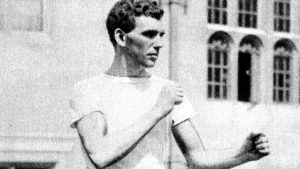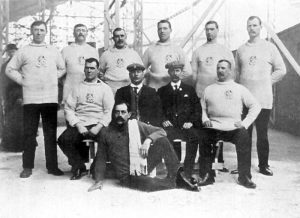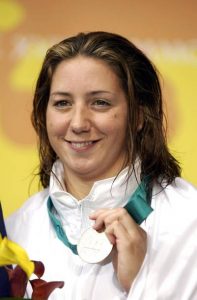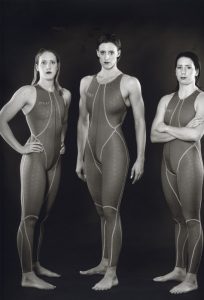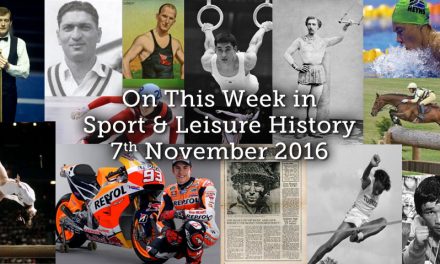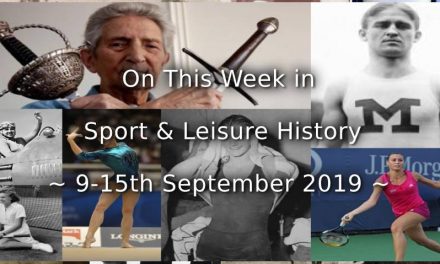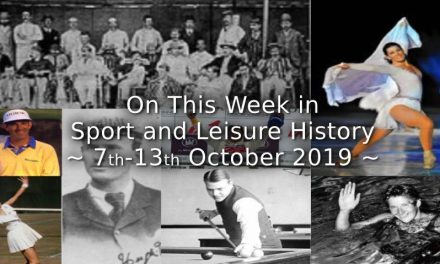28th
Born on this day in 1872 was British Olympic sprinter Charles Henry Stuart Gmelin. He was born in Krishnagar, West Bengal, India where his father was a Christian missionary, but returned to England at an early age for schooling. He holds the honour of being the first British Olympic competitor when he finished third in the inaugural heat of the 100m, but he did advance to the final. He fared better in the 400m, coming third in the final, although no awards were made for third place in the 1896 Olympics he is usually credited as a bronze medal winner, thus making him the first GB Olympic “medal” winner. Educated at Magdalen College School and Keble College, Oxford, he represented Oxford Uni at both athletics and cricket but was never awarded a blue. He obtained his BA in 1895 and in 1903 was ordained a priest. After leaving University he became an Assistant Master at Summerfields School, Oxford before becoming a Parish curate in Oxfordshire. In 1911 he moved to the north-west of England when he took up the post of headmaster at Holmwood School in Freshfield near Southport. He later returned to Oxfordshire where he was appointed the Rural Dean of Woodstock. He played cricket for Eastbourne, Oxfordshire in the Minor Counties Championship between 1896-1906, and during his time at Freshfield, he played for Formby CC in the Liverpool Competition between 1914-20. He also played football for Oxfordshire. He died aged 78 in Oxford on 12th October 1950.
29th
British sailor Alison Young was born today in 1987 in Weymouth. She learnt to sail at the age of 9 at the Trimpley Sailing Club after her father bought her sailing lessons for her birthday. Alison competes in the Laser Radial class and has been attributed as saying that she enjoys the physical and mental challenge of racing against other sailors in a one design boat. Her first international podium placing, a 3rd place, was at the 2005 ISAF Youth Worlds.She competed in the Laser Radial class event at the 2012 Olympics, where she placed fifth. At the 2016 Laser World Championships, she won gold in the laser radial class. Her best World Championship performance before this was fourth in 2012, she finished in 7th place in 2011. She has competed at the London 2012 Olympics finishing 5th and the Rio 2016 Olympics finishing 8th. For 2018 the World Championships in Aarhus are Alison’s main goal for the season in order to qualify the nation for the Olympics.
30th
Robin Anthony Fletcher, British Hockey player was born in Guildford, Surrey today in 1922. Robin started to play hockey before World War II, while studying at Marlborough College. His hockey career was interrupted by the war, as he volunteered with the Royal Navy. First serving on board HMS Gambia, Robin was diverted to the Levant (later Anglo-Hellenic) Schooner Flotilla, whose aims were intelligence gathering, striking at enemy island garrisons in the Aegean, and disrupting their communications. At the end of the war, he was awarded the Distinguished Service Cross, and promoted to lieutenant, commanding a trawler engaged in clearing mines from the English Channel. After the war, Robin went to Trinity College, Oxford to read Classics, later diverting to Modern Greek with the benefit of his war-time experience. He captained the Oxford hockey team and was selected for the British 1952 Olympic team, winning a bronze medal. In all, Fletcher was capped 22 times with the England team between 1949-55. He managed the 1964 British Olympic hockey team and from 1973-83 was president of the British Hockey Association. Robin’s graduation coincided with the establishment of a new lectureship at Oxford in Modern Greek, which he won in competition. Trinity elected him first to a Fellowship and shortly after became its Domestic Bursar. In 1967-68, Fletcher was the Senior Proctor and led the University’s governing body, the Hebdomadal Council. At the same time, he was also a member of Hart Committee, which paved the way to the reform of the relationship between the student body and the Oxford authorities. Later his interest in academic administration led to service on the Trustee Boards for a number of leading public schools. From 1980-89 he served as Warden of Rhodes House, responsible for the running of the Rhodes Scholarship. Robin died aged 93 on 15th January 2016.
- Robin Fletcher, front row, second from right
31st
Kate Louise Howey, British Judoka, was born on this day in 1973. The first British woman to win two Olympic judo medals she was originally trained by her father, an outstanding junior and won the European Junior Championship title in 1989 and 1990 and added the World Junior in the latter year. She also made an immediate impact in the senior ranks by finishing second in the 1990 European Senior Championships aged just 16. She repeated her European success in 1991 and continued her progress by winning a bronze at the World Championships in Barcelona. Kate’s first attempt to win an Olympic title was ended by eventual champion Odalis Revé but she came through the repêchage system to claim the bronze medal. She was defeated in the finals of both World and European Championships in 1993 and added further bronze medals at the European Championships of both 1994 and 1995. After a disappointing Atlanta Olympics she briefly retired but soon returned and in 1997 gave the finest performance of her life to win the world title in the 66kg class in Paris. Further medal successes followed in the next few years and she arrived in Sydney for the 2000 Olympics as one of the medal favourites. Again, her title ambitions were thwarted by a Cuban, this time in the final by Sibelis Veranes, but at least she had the consolation of being the first British woman to win a second Olympic medal. Howey again reached the world final in 2001 but by now injuries were beginning to take their toll and she retired shortly after making her fourth and final Olympic appearance in Athens. Howey, who carried the British flag at the opening ceremony of the 2004 Olympics, turned to coaching and became lead development coach with the British Judo Association. She coached Gemma Gibbons who at the 2012 Olympic Games, became the next UK woman to win an Olympic medal in judo.
1st June
British boxer Henry William “Harry” Mallin was born in Shoreditch on this day in 1892. Affiliated to Eton Old Boys Amateur Boxing Club and the Metropolitan Police Amateur Boxing Club, the London policeman and ABA champion of 1919 and 1920, opened his bid for the Olympic middleweight title at Antwerp in 1920 by out-pointing Lt. Joseph Cranston of the US Army. Cranston, who later became a General, told Harry that he could only be consoled for losing his first fight, after a 5,000 mile journey, if he knew that he had been beaten by the Olympic champion – Harry provided that consolation. In his second bout, he defeated another American, Sam Lagonia, who was disqualified for persistent holding. As the 1920 US Official Report put it, the Americans were seething with volcanic indignation at the decision and threatened to withdraw from the Games. The situation eventually calmed and, after a straightforward win over the Canadian Moe Herscovitch, Harry met another Canadian, Georges Arthur “Art” Prud’Homme, in the final. The tough French-Canadian soldier, who had won each of his three previous bouts by a KO, gave Harry a hard fight but the Englishman did enough to get the verdict. One of the people who helped chair him from the ring was his first-round victim Joseph Cranston. In 1924 he began the defence of his Olympic crown in Paris, after two easy wins he met the home-town hero, Roger Brousse, in the quarter-finals with dramatic results. The bout went the full three rounds and Brousse appeared to have won comfortably, but before the decision was announced Harry informed the officials that he had been bitten on the arms and chest, pointing to his opponent’s teeth marks in support of his complaint. Neither Harry, nor the British team managers, protested officially but when the judges awarded the fight to Brousse the Swedish officials lodged an official complaint on Harry’s behalf. The jury debated until the early hours of the morning and heard a great deal of evidence, including that of an American who said that he too had been bitten by Brousse in an earlier fight. No decision was reached at the first meeting and the jury re-convened the following evening, the boxing programme being held up until their deliberations had been completed. Finally, it was announced that Brousse had been disqualified. Pandemonium followed. Fights started around the hall and the disqualified Brousse was carried shoulder-high around the ring by his supporters. Meanwhile, Harry and his opponent in the semi-final, Joseph Beecken of Belgium, sat in the ring and watched the commotion. Eventually the bout started, Harry out-pointed the Belgian and went on to meet his teammate, John Elliott, in the final the following night.
Reports of the final are somewhat limited as, at the sight of Harry climbing into the ring, the French crowd renewed their demonstrations. It was a close fight with the verdict going to Harry, who became the first man ever to successfully defend an Olympic boxing title. This was the last fight of Harry’s distinguished career during which he won two Olympic gold medals and five ABA titles and remained undefeated in more than 300 bouts. He was manager of the British Olympic boxing team at Berlin in 1936 and the following year he gave the first ever television sports commentary in Britain when two amateur contests were transmitted from the Concern Hall, Alexandra Palace. He was again manager of the Olympic boxing team in 1952 and in his later years held high office in the ABA. His brother Fred was also a five-time British middleweight champion. Harry died in Lewisham on 8th November 1969 at the age of 77.
2nd
John James Shepherd, born on this day in Bicknor, Kent in 1884 was one of three City of London policemen to win three Olympic Tug-of-War medals – Gold in 1908 and 1920 and silver in 1912. A newspaper report of the 1908 competition told of the great feat of strength by “our policemen” who surprised the Americans Giants and the following day pulled themselves to victory against their stalwart brothers of Liverpool. It was a stirring sight, the journalist wrote, to see huge men in pitiless, blinding rain. play at tug of war and when the policemen of London had won, they set out on a triumphal march around the stadium track, soaked in rain but extremely happy in their well won hour of victory. His 26-year career with the police was interrupted by war service with the Military Police in France. After the war he won the British Cumberland & Westmoreland style heavyweight wrestling title in 1922 and 1923. He was also said to be a champion javelin-thrower, although there is no record of any performances to verify this claim. John died aged 70 in Ashton, Herefordshire on 9th July 1954.
- 1908 City of London police tug-of-War team
3rd
Happy Birthday to little old me – your erstwhile editor in chief of Playing Pasts
Karen Legg. British freestyle Olympic swimmer, also known by her married name Karen Crumpler, was born today in 1978. As well as an Olympian Karen has represented her country in the FINA world championships and European championships, and swam for England in the Commonwealth Games. During her seven-year international career (1998–2005), she won four world, two European and seven Commonwealth medals. Legg also competed for Great Britain in the 2000 Olympic Games in Sydney in the women’s 4×200m freestyle relay. In 2005, after some months of agonising and in the wake of a disappointing second Games in Athens, where she found herself let out of the GB women’s relay team for the first time in six years, she announced her retirement “…in my heart I knew it wasn’t like it used to be and that I didn’t have the drive I had years ago” she told the press. Thus ended a career in which she repeatedly pushed the boundaries of not only local swimming but, at times, of British women’s swimming at international level – She was the first Dorest swimmer to compete in the Commonwealth Games and the Olympics, twice set world short-course records with the GB 4x200m freestyle team and won two world championship titles with the same squad. Karen also BBC South’s Sports Personality of the Year and Dorest Sports Personality of the Year and Daily Echo Sporting Hero. An amazing record for a woman who could not swim a stroke until she was 12, the taught herself to swim. Despite the world relay records and titles, she rates Manchester 2002 as her greatest triumph. “Winning five medals for England in my own country was so special, Thinking about it still gives me goose-bumps” she said.
- Karen Legg on the right with Janine Belton and Karen Pickering (centre)

